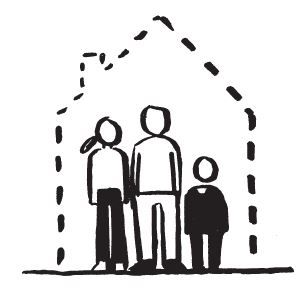Investment in Housing must be prioritised in Budget 2021

The provision of adequate and appropriate accommodation should be a key element of a new Social Contract. The current pandemic has highlighted both the spectacular failure of successive Governments to address the challenge of housing, particularly for the most vulnerable, and the need for a new Government to think beyond privatisation to more sustainable housing. As part of a new housing strategy, Government must:
Move to Eradicate Homelessness
9,335 people accessed emergency homeless accommodation in the reporting week in April 2020. This includes 1,339 families with 3,073 children. And this is just the official data. The real number would likely be significantly higher without the “statistical obfuscation, if not corruption” described in a recent report commissioned by the European Commission (Daly, 2019). Since 2014 overall homelessness has increased by 150 per cent, with the increase in family and child homelessness being 229 per cent and 249 per cent respectively. A lack of investment in homelessness prevention and the institutionalisation of vulnerable households in family hubs and emergency accommodation is not the solution. Social Justice Ireland welcomed the publication of the Housing First National Implementation Plan 2018-2021, however the action to implement it is not keeping pace with the homelessness crisis. Housing First has been used successfully in Finland to almost eradicate homelessness in its entirety. In addition to scaling up the provision of Housing First, the Government must also:
- Align data collection on homelessness to the ETHOS typology to avoid further obfuscation;
- Increase investment in prevention and supports;
- Hold a referendum on the Constitutional Right to Housing;
- Revise the insolvency legislation and Mortgage to Rent criteria for households in mortgage arrears;
- Set a time limit on the use of Family Hubs and emergency accommodation centres.
Stop Privatising Public Housing
There are currently 68,693 households on social housing waiting lists, and with the inclusion of households in receipt of the Housing Assistance Payment (HAP), households in Direct Provision, families in overcrowded Traveller Accommodation, and women and children in domestic violence situations, the real number of households (not people) in need of long-term, sustainable social housing is closer to 133,000. The Government’s build targets under Rebuilding Ireland display a startling lack of urgency, and the current pandemic has slowed construction activity through necessary safety restrictions. A continued reliance on the private rented sector has seen an exponential rise in current expenditure, with Local Authority spending on HAP, RAS and Leasing projected to reach €1.015 billion this year. Government should seek to emulate best practice in other European countries and increase social housing to 20 per cent of all housing stock. (It is currently 9 per cent). To do this, Government must:
- Retain State ownership of State land suitable for residential development for social housing provision;
- Where State land is scarce, rezone suitable commercial spaces for the provision of social housing in towns and urban centres;
- Scale down private rented subsidies and replace with long-term Local Authority or Approved Housing Body tenancies.
Rethink Construction
Ensuring a stable construction sector means changing the way we think about capital projects. Rather than spending hundreds of millions of euro in large-scale capital projects, the benefits of which will not be felt for three years (if then) we should be looking at smaller-scale, socially advantageous construction projects with higher work intensity. Investing in projects such as conversions of over-theshop units in towns and cities, and retrofitting of Local Authority housing and community spaces, provides a stable employment base at a lower cost to the Exchequer than the larger-scale capital projects. Local projects inject muchneeded revenue into towns and cities and support regional development. Because they are small scale, there is greater flexibility to scale up or down, depending on available funding; and that funding is more readily available at low interest through EU Green Deal mechanisms.
Develop a functioning Private Rented Sector
When it comes to landlord and tenant rights in Ireland, these rights are weighed heavily in favour of the landlord whose Constitutionally-protected property rights take precedence over the human right of the tenant to live in adequate, safe and sustainable accommodation. The rate of Local Authority inspections of private rented property has been consistently low, while the rate of non-compliance with basic health and safety regulations among those properties that are inspected has been high. Regulation of the private rented market must reflect its increasing importance as a housing provider, as reliance on the private rented sector increases across all sociodemographic profiles. To do this, Government must:
- Enforce HAP anti-discrimination laws and align HAP rates to market rents;
- Invest in rental property inspections;
- Legislate to increase tenants’ rights;
- Introduce long-term tenancies;
- Scale up Cost Rental.
Bring Vacant Housing back into use
Property owners and Local Authorities must be incentivised to bring vacant homes and sites into use. The introduction of a Site Value Tax and the clarification and implementation of the Vacant Site Levy would disincentivise land-hoarding; and the provision of financial incentives could encourage home owners to sell vacant properties or provide them for long-term rental.